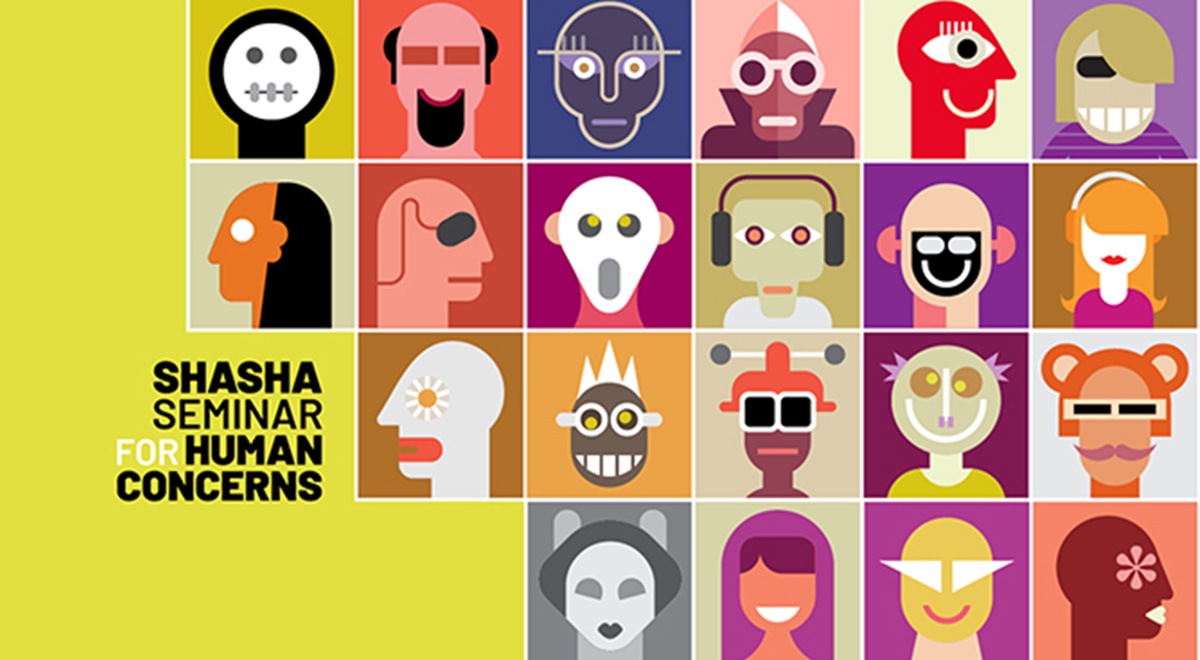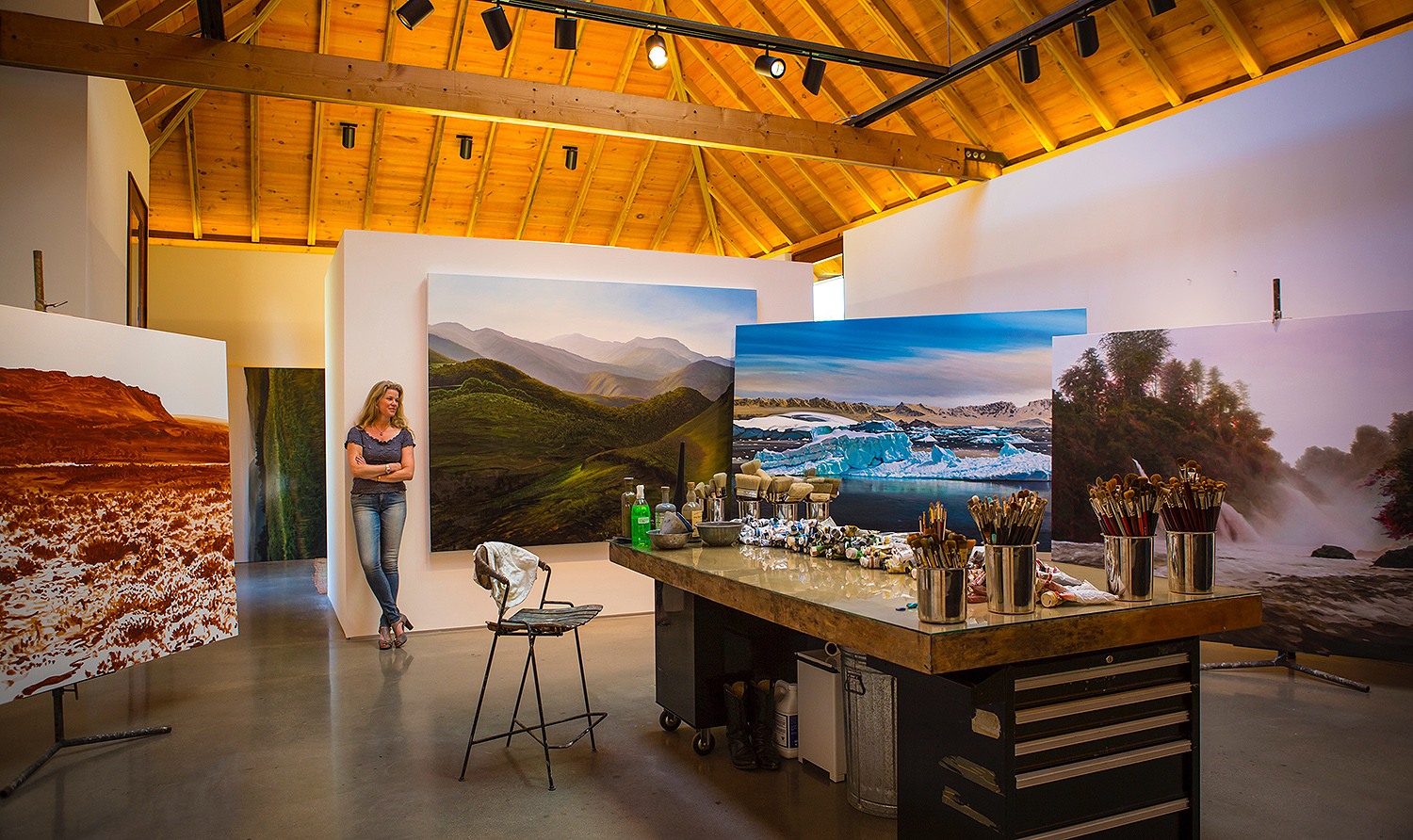Shasha Seminar on Human Concerns: Artificial Intelligence or Artificial Consciousness

Tula Telfair’s paintings explore wilderness in the form of recalled and imagined landscapes in order to acknowledge its inherent power and remarkable fragility.
“My work investigates consciousness, memory, and the subjectivity of perception to anchor our place in the world,” Telfair said.
As someone who creates photo-realistic, but materially varied and analogue process oil paintings of places that only exist in her mind’s eye, issues surrounding artificial intelligence interest her. Last year she put forward the topic: Artificial Intelligence or Artificial Consciousness for Wesleyan’s annual Shasha Seminar on Human Concerns.
“As I was imagining the proposal, my first thought was, what right do I have envisioning and organizing a symposium on the topic since I’m not a computer scientist and don’t employ AI in my work? I decided to frame the topic around how rapidly expanding developments in AI demand that people consider more carefully what it means to be human and how to define consciousness. I believe the day will arrive when lawyers argue that AI programs have earned the rights afforded to human beings,” said Telfair, professor of art and environmental studies.

Telfair wonders what it will mean for humanity when AI can model sophisticated facsimiles of human awareness and thought, and will this result in our need to redefine how human consciousness is unique?
For this year’s Shasha Seminar on Human Concerns, Telfair envisioned an event where the audience would witness unscripted conversations between highly respected individuals in diverse disciplines as they tackle and consider the subject in free flowing exchanges – no moderator, notes, or slides. “I thought it would be exciting to shape a conversation around how we understand who we are as human beings, what makes us unique, and how our view of this is going to necessarily change as a result of AI,” Telfair said.
The 16 distinguished scholars will interrogate the subject of artificial intelligence and how this tool is encouraging people to consider more carefully what it means to be human. This year’s seminar takes place November 10 and 11. Registration for the event closes on November 6.
The seminar will consist of four salon-like sessions held in Memorial Chapel. Each panel, comprised of people from discrete disciplines, will discuss the topic of artificial intelligence or artificial consciousness from a different perspective.
“I want the panelists to share their ideas spontaneously, as opposed to reading a paper or responding to a series of questions from a moderator. They have immense respect for one another but I anticipate they will disagree with and challenge each other. In the end, the vast collective of their experience and expertise will be showcased in what I hope will be a fascinating and dynamic experience for the audience, ” Telfair said.
For example, the first panel comprised of a medical ethicist, a planetary geologist, a philosopher, and an inventor will contemplate “the search to expand horizons of awareness, invention and progress, and agency.” An artist, interaction designer, architect and attorney convene in session two to talk about “authorship and legacy, bias and discrimination in design, justice, and sustainability.” Session three explores “creativity and imagination, the invention of identity, and considering human rights” with a film historian, human rights lawyer, an engineer, and a game inventor. Finally, a politician, an intellectual historian, an economist, and a journalist talk about “policy, productivity, economics, and oversight.” A complete list of speakers can be found here.
Telfair will be onstage throughout, introducing the panelists and helping to keep the conversation flowing. She is excited to hear the 16 panelists share their experiences, hopes and concerns about AI.
So, given Telfair’s profession and her quest for understanding, how would she define the question of consciousness? “In my studio practice, consciousness is the ability to recall an experience I had in Nature and hold on to it long enough to create an evocative depiction in the form or a monumental oil painting that looks highly realistic and can elicit an emotional response and a deeply felt recognition in the viewer,” Telfair said.
Telfair’s paintings are a collage of her memories and experiences in the world. “In a way, I’m doing what AI does to come up with images and information when presented with a question or suggestion – I’m mining the archive of my lived experience,” she said.
The Shasha Seminar is an educational forum for Wesleyan alumni, parents, and friends that provides an opportunity to explore issues of global concern in a small seminar environment. Endowed by James Shasha ’50, P’82, the Shasha Seminar for Human Concerns supports lifelong learning and encourages participants to expand their knowledge and perspectives on significant issues.

